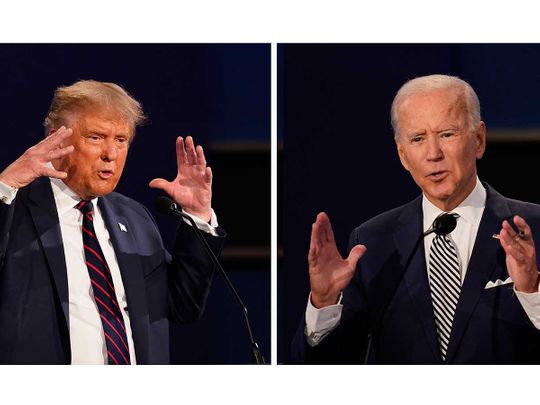
The first US presidential debate — just over a week ago, if calculated in ordinary time — was a nightmare.
Moderator Chris Wallace failed to keep President Donald Trump under control, and the dominant memory is of three white men in their 70s shouting over each other’s voices.
The one and only vice presidential debate Wednesday night was a different kind of mess, but no more useful to the voting public. USA Today’s Susan Page asked some excellent questions, but the candidates dodged them, giving mini-speeches about the subjects of their choice instead.
Page failed to effectively follow up by demanding germane answers; nor did she successfully enforce time limits — meaning that the dominant memory of that night is of a fly lingering on Mike Pence’s white hair or Kamala Harris’s pained smiling (following the ironclad women’s rule for expressing disagreement) as she repeated the phrase, “I’m speaking.”
Harris wouldn’t answer a reasonable question about whether a Biden administration would seek to add seats to the Supreme Court. Pence wouldn’t address the even more consequential issue of what he would do if Trump refused to leave office, as he’s suggested he might if he doesn’t like the results of next month’s election. (And after he failed to speak up for a peaceful transfer of power, noted Dartmouth political scientist Brendan Nyhan, Page’s only follow-up “was to ask a kid’s question about why people in politics don’t get along.”)
With these dispiriting events still fresh in one’s mind, a sensation of welcome relief flooded in when the presidential debate commission announced Thursday morning that, given Trump’s recent covid-19 diagnosis and general public-health concerns, the second Trump-Biden debate, would not be done in person next week but rather remotely.
The decision made good sense.
For safety’s sake, the candidates should not be on a stage together, with or without those unimpressive Plexiglas dividers. Even if masked and socially distant, debate staff and audience members would be in harm’s way.
The remote set-up would also offer the possibility of cutting off either speaker if he spoke out of turn, interrupted or got abusive. (One of the few blessings of this dreadful era, in which a mismanaged pandemic has already taken 210,000 American lives, is the “mute” function on Zoom.)
But no sooner did that sane announcement come than Trump did what we might all have predicted.
He picked up his marbles — what’s left of them — and went home.
“I’m not going to do a virtual debate. ... I’m not going to waste my time on a virtual debate,” he told Maria Bartiromo on Fox Business Channel in a phone interview. “That’s not what debating is all about. You sit behind a computer and do a debate. It’s ridiculous.”
Getting to the heart of his problem, he added in a disparaging tone: “And then they cut you off whenever they want.”
If the next debate is cancelled entirely, it will be a shame, in some ways. It’s slated to be hosted by Steve Scully, the political editor of C-SPAN, in a “town hall” format where prospective voters would ask the questions — something that occasionally engenders more thoughtful and less combative answers.
And generally, debates can serve an important purpose: They allow citizens to get a look at how the candidates behave under stress. At their best, these sessions can give a glimpse of a candidate’s character, nimbleness, intelligence, preparedness — especially for those viewers who haven’t been following the campaigns closely. They sometimes even produce memorable or entertaining moments that don’t involve flying insects.
Given Trump’s history, of course, his fit of pique could just be another reality-TV moment of demanding the spotlight be on him and only him. It’s likely — maybe inevitable — there will be more exciting developments yet to come.
Maybe the members of the debate commission will even buckle or compromise, though they shouldn’t. (By the way, what happened to their promise last week to supply new tools to the moderators to prevent interruptions and to keep order?)
It’s, well, debatable if next week’s planned event will come off.
But if it doesn’t, that’s perfectly fine. We’ve seen enough.
Margaret Sullivan is a noted media columnist.
Washington Post







